
Michael Bolotin, known professionally as Michael Bolton, is an American singer and songwriter. Bolton performed in the hard rock and heavy metal music genres from the mid-1970s to the mid-1980s, both on his early solo albums and those he recorded as the frontman of the band Blackjack. His early career also saw him as a successful songwriter, co-writing hits like "How Am I Supposed to Live Without You" for Laura Branigan, which he later recorded as a solo single.

Percy Tyrone Sledge was an American R&B, soul and gospel singer. He is best known for the song "When a Man Loves a Woman", a No. 1 hit on both the Billboard Hot 100 and R&B singles charts in 1966. It was awarded a million-selling, Gold-certified disc from the RIAA.

"All the Man That I Need" is a song written by Dean Pitchford and Michael Gore. The song was first recorded as "All the Man I Need" by Linda Clifford for her album I'll Keep on Loving You (1982). In 1990, American singer Whitney Houston had a number-one multiple chart hit with this song, recorded as "All the Man That I Need", from her third album, I'm Your Baby Tonight (1990).

"You Don't Know Me" is a song written by Eddy Arnold and Cindy Walker in 1955. "You Don't Know Me" was first recorded by Arnold that year and released as a single on April 21, 1956, on RCA Victor. The best-selling version of the song is by Ray Charles, who took it to number 2 on the Billboard Hot 100 chart in 1962, after releasing the song on his number 1 album Modern Sounds in Country and Western Music. The first version of the song to make the Billboard charts was by Jerry Vale in 1956, peaking at number 14 on the pop chart. Arnold's version charted two months later, released as an RCA Victor single, 47–6502, backed with "The Rockin' Mockin' Bird", which reached number 10 on the Billboard country chart. Cash Box magazine, which combined all best-selling versions at one position, included a version by Carmen McRae that never appeared in the Billboard Top 100 Sides listing.

"You Send Me" is a song written and originally recorded by American singer Sam Cooke, released as a single in 1957 by Keen Records. Produced by Bumps Blackwell and arranged and conducted by René Hall. The song, Cooke's debut single, was a massive commercial success, becoming a No. 1 hit on both Billboard's Rhythm & Blues Records chart and the Billboard Hot 100.

"How Am I Supposed to Live Without You" is a song co-written in 1982 by Doug James and Michael Bolton. The track was originally recorded by Laura Branigan in 1983, charting at number one in both the US and Canadian Adult Contemporary charts. Bolton later recorded his own version of the song that topped the US Billboard Hot 100 and became a worldwide hit.
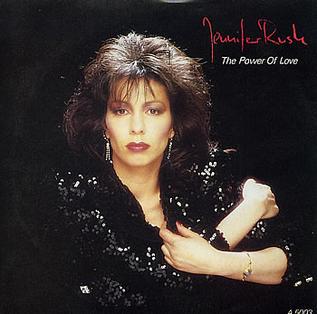
"The Power of Love" is a song co-written and originally recorded by American singer-songwriter Jennifer Rush in 1984. It was released as the fifth single from her debut album, Jennifer Rush (1984), and has since been covered by Air Supply, Laura Branigan, and Celine Dion.
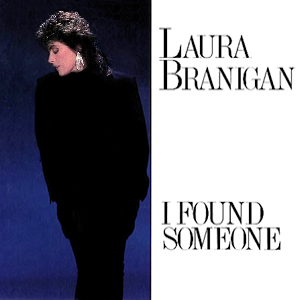
"I Found Someone" is the name of a chart single originally written and composed for Laura Branigan by Michael Bolton and Touch keyboardist Mark Mangold. The song was a bigger hit for Cher in 1987, reaching the top 10.

"Tell It Like It Is" is a song written by George Davis and Lee Diamond and originally recorded and released in 1966 by Aaron Neville. In 2010, the song was ranked No. 391 on Rolling Stone magazine's list of The 500 Greatest Songs of All Time.
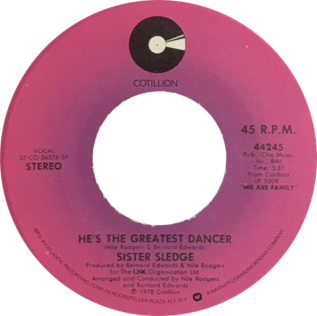
"He's the Greatest Dancer" is a 1979 song by the American vocal group Sister Sledge. Released on February 3, 1979, the song was written and composed by Bernard Edwards and Nile Rodgers, and recorded for the group's successful 1979 album We Are Family. Billboard named the song No. 66 on its list of "100 Greatest Girl Group Songs of All Time."
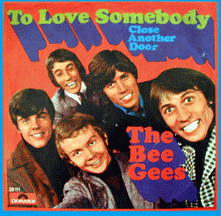
"To Love Somebody" is a song written by Barry and Robin Gibb. Produced by Robert Stigwood, it was the second single released by the Bee Gees from their international debut album, Bee Gees 1st, in 1967. The single reached No. 17 in the United States and No. 41 in the United Kingdom. The song's B-side was "Close Another Door". The single was reissued in 1980 on RSO Records with "How Can You Mend a Broken Heart" as its flipside. The song ranked at number 94 on NME magazine's "100 Best Tracks of the Sixties". It was a minor hit in the UK and France. It reached the top 20 in the US. It reached the top 10 in Canada.
"He'll Have to Go" is an American country and pop hit recorded on October 15, 1959, by Jim Reeves. The song, released in the fall of 1959, went on to become a hit in both genres early in 1960.

"Said I Loved You...But I Lied" is a song by American pop music singer Michael Bolton. The song was co-written and co-produced by Bolton and Robert John "Mutt" Lange. Released as the first single from his ninth album, The One Thing (1993), the single topped the American and Canadian adult contemporary charts, reached the top 10 in the United States and in three other countries, and was certified gold by the Recording Industry Association of America (RIAA).
"Time, Love and Tenderness" is a song written by Diane Warren and performed by American recording artist Michael Bolton. Released by Columbia as a single from his seventh album of the same title (1991), the song reached number seven on the US Billboard Hot 100 chart, becoming Bolton's fifth top-ten single in the United States. It was also the singer's fourth song to top the Billboard Hot Adult Contemporary Tracks chart. Worldwide the song reached number four in Canada, number 27 in Sweden and number 28 in the United Kingdom.

"Love Is a Wonderful Thing" is a song by American pop music singer Michael Bolton, written by Bolton and Andrew Goldmark and produced by Walter Afanasieff. The song, which peaked at number four on the US Billboard Hot 100, was included on Bolton's seventh album, Time, Love & Tenderness (1991), and released in April 1991 by Columbia. It was also successful in Canada, becoming Bolton's third number-two hit, and in Norway, where it reached number seven. The accompanying music video for "Love Is a Wonderful Thing" was directed by Dominic Sena and shot in Phoenix, Arizona.
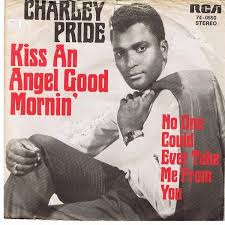
"Kiss an Angel Good Mornin'" is a song written by Ben Peters, and recorded by American country music artist Charley Pride. It was released in October 1971 as the first single from the album Charley Pride Sings Heart Songs. The song has since become one of his signature tunes and was his eighth song to reach number one on the country charts. It was also Pride's only single to reach the Top 40 on the pop charts, peaking at #21 on the Billboard Hot 100, and also went into the Top Ten of the Adult Contemporary charts. It also reached #19 on the U.S. Cash Box Top 100. The song spent four months on the pop chart, longer than any of his other hits. Billboard ranked it as the No. 74 song for 1972.
"A Woman in Love" is a song written by Curtis Wright and Doug Millett, and recorded by American country music singer Ronnie Milsap. It was released in September 1989 as the third single from the album Stranger Things Have Happened. It was his last song to reach number one on the U.S. country singles chart.

"What You Won't Do for Love" is a song by American singer-songwriter Bobby Caldwell. It was released in September 1978 as the lead single from his eponymous debut album (1978). It was written by Caldwell and Alfons Kettner, and produced by Ann Holloway. The song has been covered and sampled numerous times, including by Tupac Shakur in the posthumous 1998 hit "Do for Love".

"Then You Can Tell Me Goodbye" is a song written by John D. Loudermilk. It was first released in 1962 by Don Cherry, as a country song and again as a doo-wop in 1967 by the group The Casinos on its album of the same name, and was a number 6 pop hit that year. The song has since been covered by Eddy Arnold, whose version was a number 1 country hit in 1968, and by Neal McCoy, whose version became a Top 5 country hit in 1996.

American singer Whitney Houston, known as "The Voice", released 57 singles as a leading artist and 4 as a featured artist. Houston is one of the best-selling music artists of all time, with over 220 million records sold worldwide. In the United States, Houston amassed 11 Billboard Hot 100 number-one singles, all of whom have been certified either gold, platinum, multi-platinum or diamond by the Recording Industry Association of America and was one of a selected group of artists to have a top ten single in the Billboard Hot 100 in four different decades. She is currently ranked in seventh place of the artists with the most number one singles in the history of the Billboard Hot 100. Prior to the introduction of digital singles, Houston sold 16.5 million physical singles in the country, the most ever by a female recording artist. In October 2012, the Official Charts Company claimed Houston was the fourth biggest-selling female singles artist of all time with a sales total of 8.5 million singles in that country.



















